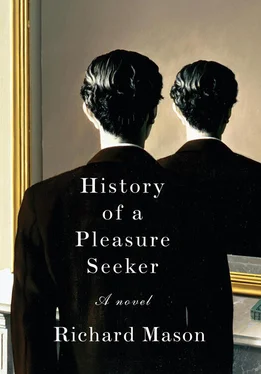He dozed for ten minutes, then straightened the cushions on the chaise longue and checked that he was presentable. He was. He locked the door behind him, put the key in its vase, and went down the stairs.
Louisa was in the hall at Herengracht 605. “Have you seen my mother?”
“Not since lunch.”
“She’s marching about in a ghastly old frock.”
Piet smiled. “Perhaps you should dress her.”
“She is beyond my assistance.”
“No one is.”
But Louisa did not reach for this pretty compliment. Instead she said, “What’s that smell of dead flowers?”
Piet stepped away from her, careful not to blush. “I’ve no idea,” he replied, and went upstairs to wash.
When informed of Piet Barol’s imminent departure, Maarten Vermeulen-Sickerts was delighted by the young man’s vim. He thought Jacobina might be angry with him for giving Piet the means to leave so soon — but it seemed, as December began, that there was nothing he could do to try his wife’s patience. Jacobina was as attentive and amusing and tender as she had been in their first year of marriage. It was marvelous. As he contemplated Christmas, Maarten felt profoundly at peace. His hotels in London and Frankfurt had reopened triumphantly and the Plaza’s Presidential Suite was booked until the middle of 1908. His debts remained burdensome, but he had again the means to service them without anxiety. Now that God was formally on his side, he did not doubt his ability to repay the capital when required.
Egbert’s remarkable recovery made him feel like Abraham: sorely tried but amply rewarded. The joy of showing his son over the properties he would one day own made Maarten giddy. To be blessed, besides this, with a thoughtful wife, two charming daughters, a house still full of fine things and a chef as gifted as Monsieur la Chaume further stoked the high spirits of the season. He was aware that Louisa was cross with him but refused to be provoked; and to each slight or cold word he responded with humor, which he considered the best medicine for her fanciful afflictions. Rising from his knees each morning, rejoicing in the ache of his body after three hours of prayer, he felt quietly secure among the Elect. For the first time in his life he was certain of salvation.
Piet Barol was also having a splendid time. Egbert was so often out with his father that he had many hours to while away in studied leisure. The secondment of three chambermaids and a footman from the Amstel Hotel allowed him to ask for things he would never have troubled Agneta Hemels for. Their acceptance of his authority showed him how much he had learned from the Vermeulen-Sickertses, and this made him sentimental. He completed his sketches of the most arresting pieces of furniture and presented twelve of the best to Maarten. He sang for the guests who came four nights of every seven and went skating with the girls and their friends on the lake in the Vondelpark and enjoyed Egbert’s enthusiastic devotion. With deepening affection he took him over the house and taught him to appreciate the treasures that would be his.
By mutual and wordless consent neither he nor Jacobina alluded to their indiscretions or made any attempt to resume them. They had had their fill of one another. Neither wished to blur by repetition the perfections of their last encounter.
Piet’s final day was set for December 20th. He would spend the holidays with his father in Leiden and sail for Cape Town in January. To his great satisfaction, Maarten proposed a farewell dinner and Constance threw herself into organizing it. The guests were invited for Wednesday 18th. That afternoon Piet was sitting on the first-floor landing, sketching the statues beneath the dome, when Louisa Vermeulen-Sickerts sat down beside him.
“There should be four, of course,” she remarked.
“Four what?”
“Figures. That’s Paris in the center, but there are only two goddesses when there should be three. The myth says Aphrodite, Athena and Hera competed for his golden apple.”
“A dangerous contest.”
Louisa kept her hands still; she was nervous and tempted to play with her fingers. “He gave it to Aphrodite, who bribed him with the love of Helen of Troy. He would have done better to take the riches Hera offered him, or Athena’s wisdom.”
“I didn’t know you were a classical scholar.”
“There’s a good deal you don’t know about me, Mr. Barol.” Louisa had promised herself to meet his eyes, but when the moment came she could not. “We will lose our very own Paris when you go.”
“In me?”
“Of course. The only young man in a household of women.” She smiled. “It fits beautifully, does it not? Constance is the prettiest. Aphrodite, if you will. I’m the wisest, like Athena.”
“And Hilde is Hera, queen of the gods?”
“Not Hilde. Mummy.”
“What nonsense you talk.”
She laughed, and he saw she had no idea of the truth she had stumbled so close to. “It’s obvious she’s fond of you. Everyone is. But it was Athena who helped heroes. Don’t forget that.”
Since her encounter with her father, Louisa Vermeulen-Sickerts had given her full attention to the question of how to leave her family without destroying it. She loved her parents too well to escape their care by any means that would shame or wound them. She could not elope or run away. Neither could she bear the idea of joining forces for life with any of the young men she and her sister danced with. Besides, she knew that to live independently of her father she would have to leave Amsterdam.
It had taken her some time to see that the solution to her problem was right before her. She did not dislike Piet Barol. She thought him unscrupulous but admired his guile more than she let on to Constance. He was a man who could make things happen, and their not being in love was surely an advantage. She had too much experience of her sister’s chaotic affairs to believe in the longevity of romance. It would be wiser to trust Piet’s self-interest, which would never let her down.
She took his hand. “Let me come to Cape Town with you.”
“What?”
“Marry me.”
“What on earth?”
“Please, Piet. I cannot live my life in this house. I must escape.”
“From whom?”
“From my family, much though I love them. Let me come with you. I’ll not be a burden.”
Piet’s astonishment was so sincere he could not mask it. He took his hand from hers, afraid that someone would see.
“It is not a very romantic proposition, I grant you.” Louisa was aware that a passionless proposal might offend a man as vain as Piet Barol, but she could not lie. “You do not love me, nor I you. But many marriages prosper without that fickle commodity. We are both intelligent and ambitious. We are amused by one another. Together we would make a formidable pair.”
“You do me a great honor, but—”
“I could not run away. It would cause my parents too much pain. Yet to stay here, to live this frivolous life forever, will cause me too much pain. My father says a woman may fulfill herself by helping a man succeed. I am capable of more, but it is a place to start.” The skepticism on Piet’s face made her promise recklessly. “I should not mind if you took a lover. I have no inclination to children, but would bear you one if you wished. You — I–I will have a sizable dowry. You may keep it all for yourself.”
This last concession struck quite the wrong note. “I would not consider that,” said Piet with dignity; and then, more gently, because he could see what this offer cost her: “It is hopeless, Louisa.” It was the first time they had used each other’s Christian names. “Your father would never permit it. I am from quite a different class.”
Читать дальше












